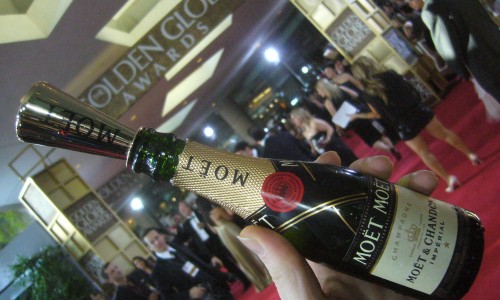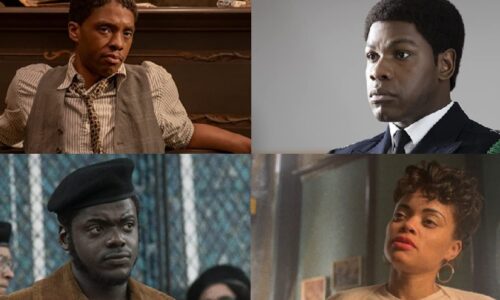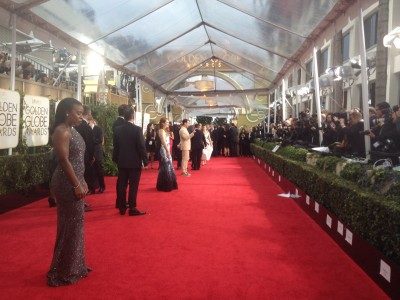“Thank you to the all-white Hollywood Foreign Press,” the British star Sacha Baron Cohen said as he accepted his Golden Globe, when Borat Subsequent Moviefilm was named the Best Comedy or Musical film at last month’s awards ceremony.
His satirical sideswipe at the organisers – the Hollywood Foreign Press Association – followed an LA Times expose, before the ceremony, which revealed that there was not a single black member among the 87 journalists making up the body that selects the second highest profile awards in the film calendar, after the Oscars.

This hugely influential group of international entertainment reporters have long punched above their weight, with regard to the power wielded in Hollywood, with a few dozen largely unknown people picking honours that kick off the race for Academy Awards, which are voted for by approaching 10,000 film industry professionals.
Baron Cohen is a comedian and his comment was tongue-in-cheek. He knows full well that with every member of the HFPA by definition representing non-US media outlets, coming from countries as far and wide as India, Japan, Egypt and Colombia, it is far from “all white.” Even the LA Times’ own article acknowledged “While the HFPA’s ranks include a number of people of color, there are no Black members.”
But in a country where 13% of the population identify as black, the revelation that not one of the HFPA’s 87 members was black shook up the entertainment industry at a time when Black Lives Matter remains a dominant force in public discourse, Meghan Markle hit the headlines for noting that a member of the Royal Family wondered how dark her son’s skin would be and the Oscars So White controversy still haunts the film business on both sides of the Atlantic.
Initial responses to the LA Times story, from HFPA members speaking in a personal capacity, noted that 35% of members – about 30 journalists – were non-white and they could not be expected to make sure that every ethnicity of the world was represented in proportion to the global population. And allegations that the organisation must be racist if it has no specifically “black” members were dismissed by highlighting that not only does its membership include a wide range of ethnicities, but recent presidents of the organisation include two women of colour – Aida Takla, from Egypt and Meher Tatna from India. Members also speak of donating millions of dollars to diversity programmes in the industry, honouring black stars and supporting talent from minority ethnic groups. Critics threw fuel on the fire by noting that in 2013, a black British journalist had her application to join the organisation rejected – the responses to which included that she did not represent any foreign press outlets and that over the same time frame, dozens of white journalists have also had their applications rejected.
But on the night, the HFPA officially recognised that there was “work to do” and acknowledged that “black representation is vital.”

As the industry waited to find out how the HFPA would respond, earlier this week, a group of 100 Hollywood publicists released a damning letter to their own clients, advising them not to work with the HFPA until changes are made. They accused the organisation which last month handed Golden Globes to Chadwick Boseman, Andra Day, Daniel Kaluuya and John Boyega of “discriminatory behaviour.”
The letter went on to deliver an ultimatum: “To reflect how urgent and necessary we feel this work is, we cannot advocate for our clients to participate in HFPA events or interviews as we await your explicit plans and timeline for transformational change.”
The HFPA was swift to respond, pledging in a statement to increase its membership to at least 100 this year and ensure that at least 13% of the membership be black journalists, in line with the population of the US, rather than the foreign countries they represent. The statement also refers to “a comprehensive review of our governance and code of conduct,” acknowledging that a change in membership eligibility might be required to meet the new pledge, because it could be difficult for the Hollywood Foreign Press Association to find 13 black journalists, based in Los Angeles and registered with America’s Motion Picture Association, but representing foreign media outlets, within the next nine months.
In its conciliatory statement, the HFPA also noted, “We also acknowledge that we should have done more, and sooner.” Proposals are being implemented by the organisation’s newly appointed Strategic Diversity Advisor, Shaun Harper. “As a demonstration of our commitment, the board has unanimously approved” the plan, the HFPA revealed, before discussing it with the wider membership. A source noted that that meeting was told that there was only one black publicist among the many threatening to withdraw the cooperation of their stars.
Writing for the industry magazine Variety, an Arab HFPA member, Husam Asi, described racism he had experienced in the film and media world more generally, warning that taking down the HFPA wouldn’t solve the diversity problem in a “predominantly white” industry. “You would be hard pressed to meet a Black executive or a publicist or even a journalist,” he noted, suggesting that, “Even with its new initiatives, the HFPA will not achieve true diversity if the industry at large doesn’t follow suit,” challenging critics of the organisation to open up their own gates to journalists or publicists of colour to “give them a seat at the decision-making table… The more jobs you give them the more of them can apply for and join the HFPA and the more influence they will have in the industry.”
Even before the race row emerged, the HFPA’s application process had come in for controversy, with claims that members from particular countries would block applications from rival journalists serving their territories, to protect their ability to provide exclusive stories. In one such case, a Russian member, Nellee Holmes, was suspended for extortion and bullying a Ukrainian applicant, but when the HFPA was asked for comment, it declined and tried to suppress the story, in a way that it could not in the current climate.

Similarly, it’s faced accusations about the reasoning and process by which the nominations are reached. With such a small membership, compared with the Academy’s nearly 10,000, critics argue that it could be possible for studios to sway members with gifts and trips. In 2011, the poorly received Burlesque was nominated for Best Comedy or Musical after Cher hosted HFPA members in Las Vegas and the similarly poorly reviewed The Tourist was nominated in the same category, supposedly because voters wanted to mingle with Angelina Jolie and Johnny Depp. As recently as this year, the TV show Emily In Paris was nominated for Best Comedy or Musical TV series, after HFPA members were invited to Paris by Netflix.
Sources close to the Hollywood Foreign Press Association said at the time that the flights were paid for by the HFPA, not Netflix, and pointed out that members take up to 20 trips per year and many of the other shows visited were not nominated.
So the HFPA has long been a secretive organisation that’s been accused of improprieties, but it’s generally refused to comment and got away with it. For years, it’s managed to sweep allegations of corruption under the carpet – either by ignoring them in the hope that they’ll go away or by silencing members who raise concerns. And all the while, studios, publicists and most of the media have been happy to turn the other way and continue to enjoy the glitz and glamour of the awards ceremonies and celebrity parties.
Even the allegations of rape against Harvey Weinstein and the Me Too movement that stemmed from them shook but never threatened the Hollywood machine and its bandwagon.
But coming soon after the Oscars So White scandal – in which all of the acting nominees were white, for two years running – the reigniting of the Black Lives Matter movement by the police killings of Breonna Taylor and George Floyd have shown that racial injustice appears to be the loudest clarion call for change – and the only one that can shake an organisation such as the HFPA into action.
